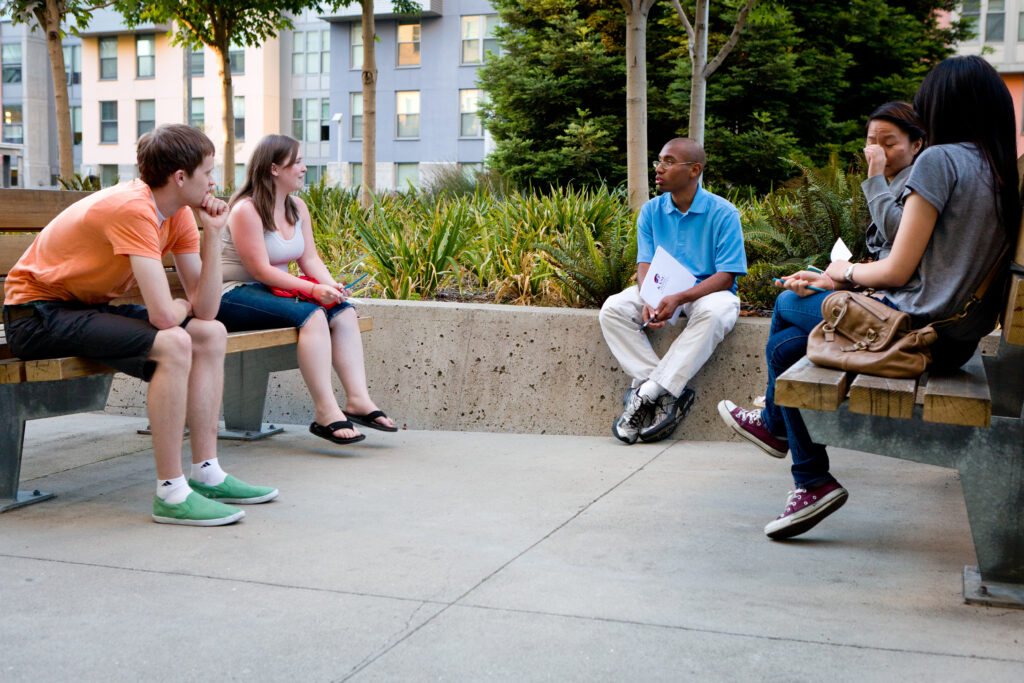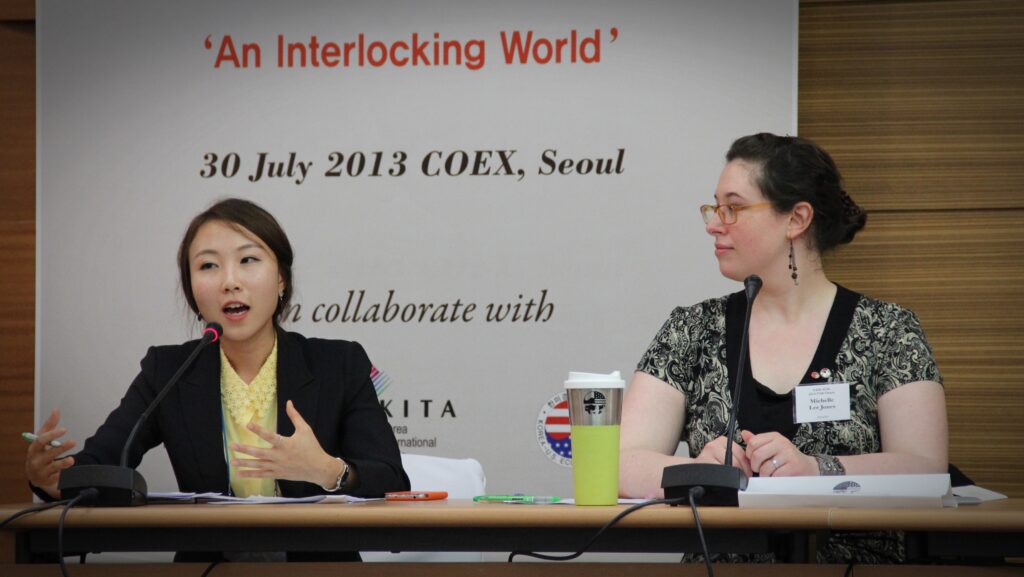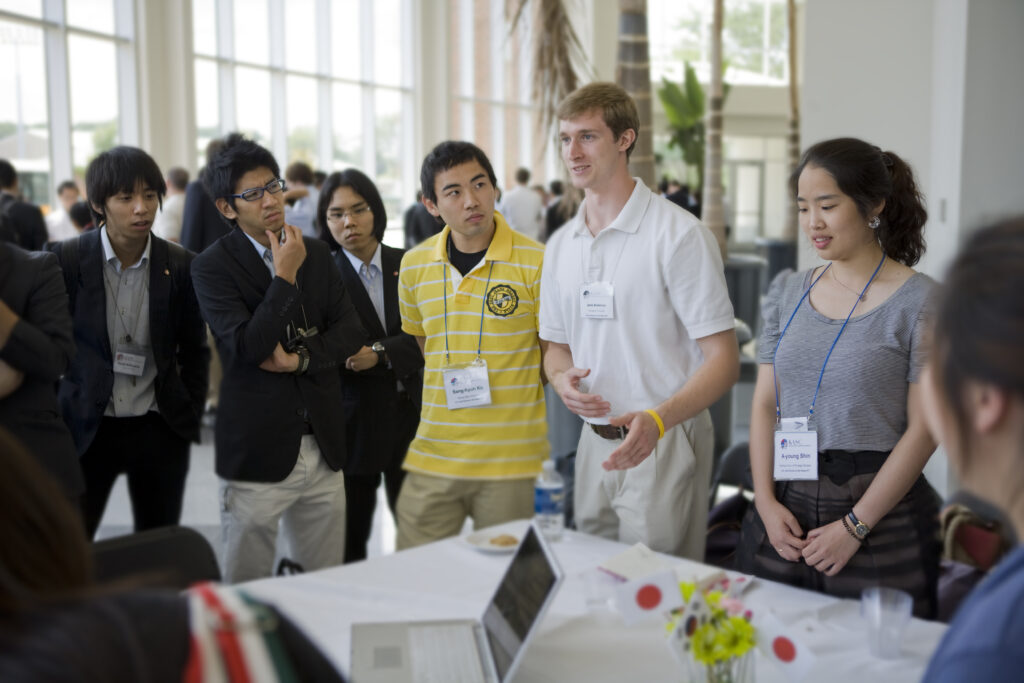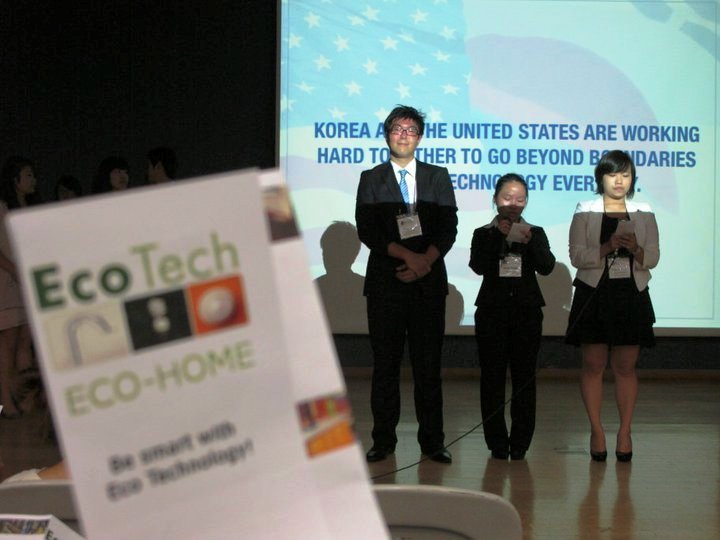16th KASC Roundtables

Roundtables
Participating in a Roundtable (RT) is an important part of the KASC experience. American and Korean Delegates have the opportunity to discuss important issues in a smaller group setting and share their personal opinions and experiences with their peers with a spirit of understanding each other’s point of view. These discussions are fairly informal and will naturally become more complex over the course of the conference. As a general timeline, Delegates will broadly explore their RTs in the first week, narrow their focus and determine their topic for Final Forum in the second week, and then jointly develop their final project in the third and final week.
Education and Identity
Carve the peg only after you have observed the hole.
Korean proverb
The right to education is highly emphasized in both Korea and the United States, whether it had been rooted in the values of Confucianism or gateways to the American Dream. Therefore, the histories of education in both countries are rich in complexity and notably shape modern society today. Some might even argue that because of this, education is the key to solving some of the most unsettling crises within domestic and international systems! It is understood that personal and worldly development is strongly correlated to a quality education, but common thought often diverges when assessing how to best cultivate future leaders and to what extent should institutions push the generations’ youth. As college students, we can all relate to this roundtable, as well as relay our unique experiences. Here delegates will investigate the contents, methods, and values of education in Korea and the United States, and how these factors affect our careers and daily lives.
Questions to Consider:
- What are the similarities and differences between Korean and US academic culture? How do these daily stressors (school subjects, grades, extracurriculars, hagwons (Korean cram schools), college applications, financial burdens, etc.) shape the lives of young adults, and why is it important to question these norms? How do these academic cultures affect individuals even after graduating?
- How are foreign language classes taught differently in school between the two countries? Is there a different level of importance or class structure for these school subjects? What does this say about the international presence of Korea and the United States?
- Considering Korea and the United States’ educational models, how can we design the best education system(s) for the next generation?
- How does one’s family influence or expect an individual’s performance in education? How can educational institutions provide more support for its students’ learning and identity when coming from various backgrounds?
- What kinds of inequality of opportunity exist, and how are they related to income and geographical factors?
- What are some pressing challenges of students today? How does education and identity intertwine in a young child/adult’s life?
- What is the role of education in foreign policy and cross-cultural relationships?
Technology and International Security
In today’s world, the security of every one of us is linked to that of everyone else.
Kofi Annan

With the rise of globalization, rapid development of technology is changing the landscape of domestic and international security as the impact of technology development is far less localized. Geopolitical tensions are rising and nations around the globe increasingly view technology as central to national security. Indeed, technology is a double-edged sword. It brings safety to the people and enhances the national defense system, but concurrently, it is developed into destructive weapons used in wars. AI (Artificial Intelligence), autonomous robots, and UAVs (Unmanned Aerial Vehicle) operations continue to mature, and even social media can be weaponized to spread disinformation and threaten democratic values.
South Korea (ROK) and the United States have over 70 years of alliance. The two nations emphasize technology development and information exchanges to strengthen partnership and address the challenges to both national and international security heightened by authoritarian regimes and rise of populism. This Roundtable Topic aims to explore the altering political and security landscapes through technology in both countries.
Questions to Consider:
- What are the current trends of technology and innovations in ROK and the U.S? Are there joint or complementary investments in technology to foster shared values and interests?
- How did the development of technology alter traditional military / security concerns?
- How has technological cooperation changed over different presidencies in the U.S and ROK? What political and security impact did it have on the Korean peninsula?
- Globalization and intertwined diplomatic relations have posed great complexity to international security. Therefore, how do these conditions impact ROK-US technological cooperation?
- What are the pros and cons of technology cooperation? Are there political and economic benefits and risks to both countries?
- How does social media impact democracy in both countries? What are the common efforts that both governments are making in order to maintain a healthy digital environment? (Remember, national security does not only refer to military activities, but also involves democratic values)
Environment / Climate Crisis
Look deep into nature, and then you will understand everything better.
Albert Einstein
The current climate crisis on Earth is a very serious situation. The major causes of large fires, droughts, forest fires, and floods in many countries in recent years are also due to the climate crisis. For instance, studies show that the outbreak of the COVID-19 pandemic is partially due to climate change and human activities. As the Earth’s temperature rose, tropical bats moved their habitats on a large scale to southern China. Bats are commonly known carriers for various diseases, such as the coronavirus. So, as humans developed the habitats of bats that were deep in the forest, they overlapped and spread to pandemics.
Many countries are currently working to respond to the climate crisis based on the Paris Agreement adopted in 2015. Unlike the Kyoto Protocol, which focuses on carbon reduction obligations and penalties to the advanced countries, the Paris Agreement was a breakthrough for both developed and developing countries participating in carbon reduction through the supply of “low carbon technologies” from the GCF (Green Climate Fund). Above all, the Paris Agreement is meaningful in that approximately 200 countries “voluntarily” joined in the carbon reduction effort and slowed global average temperature rise, whereas only about 40 countries signed the Kyoto Protocol.
What should we do in this situation? And what can we do now?
Honestly, it is difficult to come up with solutions that can be negotiated or agreed upon by the majority of countries due to their domestic circumstances. This roundtable will discuss how individuals and governments can make efforts to respond to the climate crisis and how they can lead to a large-scale solution. Furthermore, we aim to establish an initiative to create a carbon-neutral society by 2050, discussing what efforts should be made at the corporate and national levels.
Questions to Consider:
- What does carbon-neutral mean?
- Do you know the Paris Agreement? How will the Paris Agreement change our society in future?
- What are the main causes of the environmental issues and climate crisis currently?
- What is the most terrible result of the climate crisis do you think?
- What can people do on a personal/organizational/corporate/national level to help resolve the current environmental / climate crisis trends?
- What efforts have you made to respond to nature/environmental/climate change?
- What are the current institutions for the environment / climate crisis? What they do to protect the environment?
- Are there any solutions that Korea and the U.S can cooperate on to help resolve the environmental / climate issues? How?
- Is it possible to protect nature and the environment while developing a country?
- Will you have any environmental related jobs? What might these look like?
International Development Cooperation

You have to take ownership and leadership of tomorrow. For that to be possible, you have to strengthen your capacity and widen your vision as a global citizen.
Ban Ki Moon
In line with global reconstruction after World War II, As many might know, European countries, the United States, and Canada came together in 1961 and established the Organization for Economic Co-operation and Development, also known as OECD. It aims to stimulate economic growth and raise standard of living with emphasis on providing economic assistance to reduce poverty and dispatching experts in various fields to developing nations.
Their efforts certainly saw fruition. South Korea was the first first country to progress from recipient country to donor country. However, despite massive aids and efforts the OECD poured in, they continue to receive criticisms on the effectiveness of international aid, failing to bring economic growth and poverty reduction. There are still over 600 million people living under the extreme poverty line, earning less than $2 a day, and suffering from curable diseases, especially in Southern Africa.
*The US – Korea relations in the history of development cooperation.
South Korea used to be among those countries in extreme poverty with less than $100 GDP per capita after the Korean-war. During this devastating period, foreign aid was crucial for rebuilding the economy. While there are several fields that South Korea needs to improve on, such as income inequality and pensions, no doubt that South Korea is one of the largest economies in the world today.
In this roundtable, we will look into general concepts of international development cooperation and further discuss the reasons for continued extreme poverty in different regions, and ways we can actively contribute to international development. During the journey, we hope to find out ways to contribute as individuals and what can the governments do to improve their current effort and the enrichment of life for all.
Questions to Consider
- How do you define poverty?
- Does poverty cover only economic aspects?
- What factors cause or contribute to poverty?
- What is ODA?
- When did international development cooperation begin in earnest?
- What is the Marshall plan?
- Do you think international aid is really efficient?
- What are the international institutes for development cooperation?
- How did the US contribute to the rapid growth of South Korea?
- What types of roles are the US and South Korea playing in the field of international aid and development?
- What do you think Korea/US can do to be of help to development?
Final Forum

The objective of RTs is to jointly identify a specific challenge related to the RT topic and develop a creative and innovative solution. Delegates can expect to complete both a relatively brief written report as well as presentation slides. RT groups will present their research before the rest of the delegation, KASC alumni, and expert panelists who will ask questions and provide feedback. The conference will officially conclude following the Final Forum with a formal Closing Ceremony.